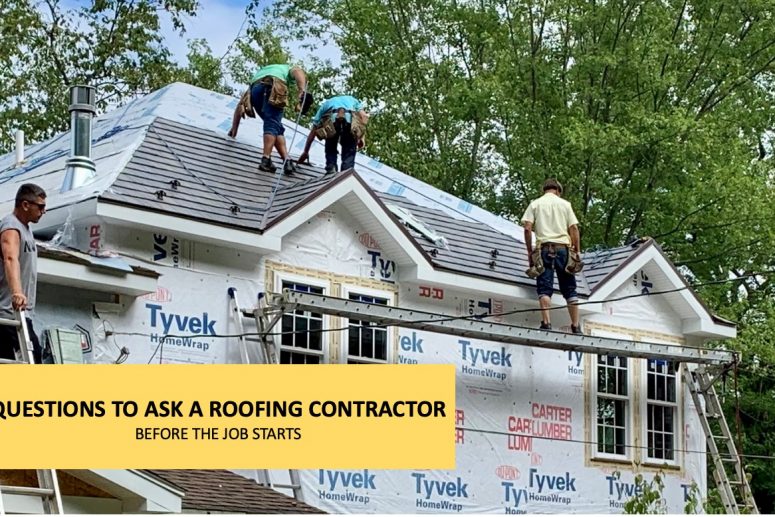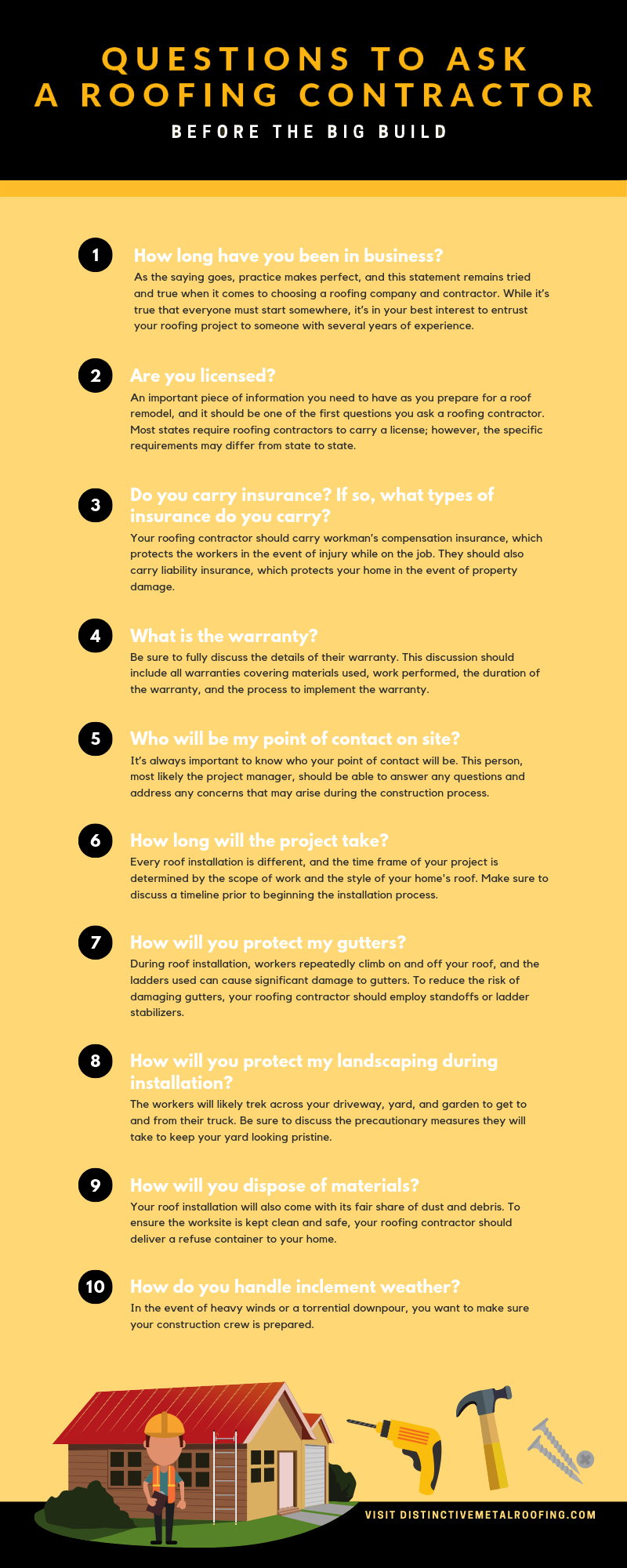

Home renovations can be quite extensive and often require a lot of planning, and a roof installation is no different. Before you dive into such a large project, you want to make sure you have the best people for the job. Unfortunately, most states have few or no regulations regarding roofing contractors and installers, or have building code requirements for roofing your home. Because the cost of entry into the roofing profession is fairly low, there are a number of people out there who are not properly trained or have the experience to do a quality job.
When evaluating a contractor, be sure to ask the prospective contractor questions, and never feel like there are too many questions! A professional roofing contractor understands the investment you are making in your home and will welcome your questions. Below are some important questions to ask a roofing contractor before you begin your next home renovation.
How long have you been in business?
As the saying goes, practice makes perfect, and this statement remains tried and true when it comes to choosing a roofing company and contractor. While it’s true that everyone must start somewhere, it’s in your best interest to entrust your roofing project to someone with several years of experience. For many roofing professionals, training is done on the job, so it stands to reason that the most reliable companies are those who have been on the job the longest. For contractors who have been in business for several years, ask to look at their portfolio or seek out reviews from past clients. Asking to talk to recent customers to see how satisfied they were and if they would recommend the roofing contractor can be a great way to assess the quality and reliability of your roofing contractor.
Are you licensed?
An important piece of information you need to have as you prepare for a roof remodel, and it should be one of the first questions you ask a roofing contractor. Most states require roofing contractors to carry a license; however, the specific requirements may differ from state to state. Building codes and permit requirements also vary between cities and states, so be sure to contact your local government regarding permits and licensure prior to your roof renovation. Your roofing contractor should be able to provide documentation of proper licensure, and the license should be kept up to date. A current and valid license ensures your roofing contractor is properly trained and can install or repair your roof efficiently, accurately, and—most of all—safely.
Do you carry insurance? If so, what types of insurance do you carry?
Like with any renovation project, a roof remodel comes with its own unique set of risks. The best way to mitigate these risks is to ensure your roofing contractor carries proper insurance. First, your roofing contractor should carry workman’s compensation insurance. This not only benefits the workers, as it protects them in the event of injury while on the job, but it also benefits the homeowner. It places liability for any injuries on the roofing company rather than on you. Your roofing contractor should also carry liability insurance, which protects your home in the event of property damage. Liability insurance places accountability for any property damages incurred during the construction process strictly on the roofing company and contractor. When you ask your roofing contractor about the insurance they carry, be sure to obtain physical documentation to ensure everything runs safely and smoothly.
What is the warranty?
Installing a new roof is a big investment, so you want to make sure it will remain in good condition for many years to come. Prior to choosing a roofing contractor, be sure to fully discuss the details of their warranty. This discussion should include all warranties covering materials used, work performed, the duration of the warranty, and the process to implement the warranty. Warranties will differ based on your contractor’s policies and the building materials used. Roofs built with asphalt, for instance, typically have a warranty between 10 and 20 years. Metal roofs, however, are much more durable, so their warranty generally lasts at least 40 years.
Who will be my point of contact on site?
Throughout the roofing process, you will likely be in contact with several people. Before work begins on your home, it’s always important to know who your point of contact will be. This will most likely be the project manager. The project manager should be able to answer any questions and address any concerns that may arise during the construction process. This will also be your point of contact if something goes wrong or plans need to be altered. The salesperson who sold you the roof job is the person most responsible for the job. Verify the salesperson will not disappear after the contract has been signed. The salesperson is responsible for the commitments made to you about the project and should be available to you at all times.
How long will the project take?
Every roof installation is different, and the time frame of your project is determined by the scope of work. The style of your home’s roof may also affect the timeline for the project. Roofs with multiple hips and gables, or roofs with additions such as garrets, may take a bit longer to renovate. Ask when your project can be scheduled. You should discuss a timeline with your roofing contractor prior to beginning the installation process to help level your expectations and ensure everyone is one the same page. Ask what a normal workday looks like and make sure the Project Manager contacts you directly if there are any exceptions. A good roofing contractor will also keep you informed throughout the job to make sure the job is on track and meeting your expectations
How will you protect my gutters?
Your gutters play an important part in protecting your home against water damage. Damaged gutters will not properly drain water away from your home, which will cause the water to deposit closer to your house and potentially damage the foundation. During roof installation, workers repeatedly climb on and off your roof, and the ladders used can cause significant damage to gutters. To reduce the risk of damaging gutters, your roofing contractor should employ standoffs or ladder stabilizers. This equipment reduces the strain placed on gutters and reduces the risk of creating further roof damage.
How will you protect my landscaping during installation?
Not only does a roof installation involve climbing on and off your roof, but the workers will likely trek across your driveway, yard, and garden to get to and from their truck. When you choose a roofing contractor, be sure to discuss the precautionary measures they will take to keep your yard looking pristine. Often, during the installation process, old shingles and roofing materials are dropped from your roof to a tarp or garbage receptacle waiting below. To protect against falling debris, you should have bushes, gardens, decks, and patios safely covered.
How will you dispose of materials?
Your roof installation will also come with its fair share of dust and debris. To ensure the worksite is kept clean and safe, your roofing contractor should deliver a refuse container to your home. Prior to the delivery of the refuse container, be sure to discuss the intended location with your roofing contractor. Dumpsters and other garbage receptacles are quite heavy, even when empty, and only become heavier as they’re filled with debris from your roof. Take extra care when you determine the location of this container, as they can potentially cause cracks in your driveway due to their extreme weight. If your contractor does intend to place the container on your driveway, discuss additional precautions, such as placing plywood under the container, to reduce the risk of driveway damage.
How do you handle inclement weather?
Mother Nature is often quite finicky, and weather can throw a wrench in home construction plans. In the event of heavy winds or a torrential downpour, you want to make sure your construction crew is prepared. The project manager will always be monitoring the weather and adjust their plans for the day accordingly. To protect your exposed roof during the construction process, your roofing company should have the ice guard and underlayment installed, or tarp and cover your exposed roof at the end of each day, even if rain is not in the forecast. After all, it’s always better to be safe than sorry.
Preparedness is key when you begin a home renovation, and we understand that. The Distinctive Metal Roofing team have been meeting and exceeding customer roofing needs for more than 10 years. For answers to any and all your roofing queries, contact Distinctive Metal Roofing – Ohio’s Metal Roofing Experts!


